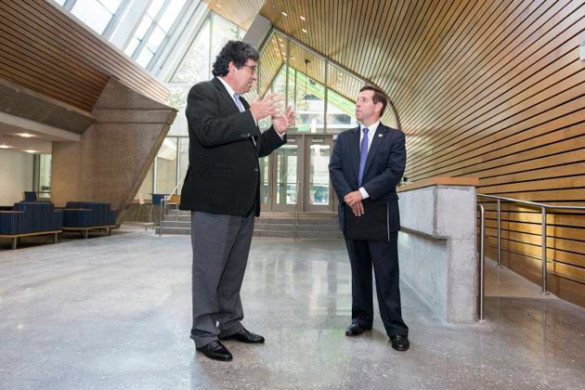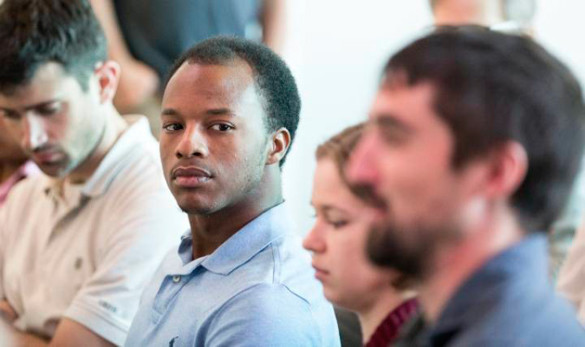
Chancellor Nicholas S. Zeppos welcomed U.S. Rep. Chuck Fleischmann, R-Tenn., to Vanderbilt University Oct. 4 for a visit to the new Engineering and Science Building, a tour of the Wond’ry and a question-and-answer session with graduate students and researchers about the outlook for federal investments in science and engineering research.
Zeppos thanked Fleischmann for his commitment to supporting funding for science and engineering research, including key Vanderbilt priorities. The two agreed on the importance of a holistic approach to scientific queries. “Often in science, there are philosophical questions as well as scientific questions,” Zeppos said. “It’s important that we support a comprehensive methodology to solving problems.”
Since 2010, Fleischmann has represented Tennessee’s 3rd District, which includes Chattanooga and the Oak Ridge National Laboratory. During his first term, he served on the House Science and Technology Committee. He is now Tennessee’s only House member on the Appropriations Committee and serves on subcommittees that fund the National Institutes of Health and the Department of Energy’s Office of Science. Fleischmann is also co-chair of the Nuclear Cleanup Caucus.
Robert Grajewski, Evans Family Executive Director of the Wond’ry, provided Fleischmann with a tour of Vanderbilt’s just-opened innovation center, including its meeting rooms, makerspaces and a distance learning classroom. Fleischmann also looked in on the construction progress of the clean room and greeted faculty members and students.

After the tour, Graduate School Dean Mark Wallace introduced Fleischmann to about 30 graduate students and researchers for an hourlong discussion focused on federal funding for research. “We’re grateful for your steadfast support of science and technology,” Wallace said, noting that Vanderbilt “is proud to be one of our nation’s leading research enterprises, but even more proud to be part of the Tennessee ecosystem. That couldn’t exist without our partnership with the federal government and agencies like the National Institutes of Health, the National Science Foundation and the Departments of Energy and Defense.”
In answer to students’ questions about how they could become involved in science policy, Fleischmann said: “Become an advocate for your work and make your work known. Vanderbilt does an exemplary job in its outreach.”
The visit was coordinated by Vanderbilt’s Office of Federal Relations.